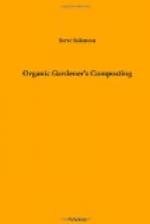PART TWO
Composting For The Food Gardener
Introduction
There is a great deal of confusion in the gardening world about compost, organic matter, humus, fertilizer and their roles in soil fertility, plant health, animal health, human health and gardening success. Some authorities seem to recommend as much manure or compost as possible. Most show inadequate concern about its quality. The slick books published by a major petrochemical corporation correctly acknowledge that soil organic matter is important but give rather vague guidelines as to how much while focusing on chemical fertilizers. Organic gardeners denigrate chemicals as though they were of the devil and like J.I. Rodale in The Organic Front, advise:
“Is it practical to run a garden exclusively with the use of compost, without the aid of so-called chemical or artificial fertilizers? The answer is not only yes, but in such case you will have the finest vegetables obtainable, vegetables fit to grace the table of the most exacting gourmet.”
Since the 1950s a government-funded laboratory at Cornell University has cranked out seriously flawed studies “proving” that food raised with chemicals is just as or even more nutritious than organically grown food. The government’s investment in “scientific research” was made to counter unsettling (to various economic interest groups) nutritional and health claims that the organic farming movement had been making. For example, in The Living Soil, Lady Eve Balfour observed:
“I have lived a healthy country existence practically all my life, and for the last 25 years of it I have been actively engaged in farming. I am physically robust, and have never suffered a major illness, but until 1938 I was seldom free in winter from some form of rheumatism, and from November to April I invariably suffered from a continual succession of head colds. I started making compost by Howard’s method using it first on the vegetables for home consumption.... That winter I had no colds at all and almost for the first time in my life was free from rheumatic pains even in prolonged spells of wet weather.”
Fifty years later there still exists an intensely polarized dispute about the right way to garden and farm. People who are comfortable disagreeing with Authority and that believe there is a strong connection between soil fertility and the consequent health of plants, animals, and humans living on that soil tend to side with the organic camp. People who consider themselves “practical” or scientific tend to side with the mainstream agronomists and consider chemical agriculture as the only method that can produce enough to permit industrial civilization to exist. For many years I was confused by all this. Have you been too? Or have you taken a position on this controversy and feel that you don’t need more information? I once thought the organic camp had all the right answers but years of explaining soil management in gardening books made me reconsider and reconsider again questions like “why is organic matter so important in soil?” and “how much and what kind do we need?” I found these subjects still needed to have clearer answers. This book attempts to provide those answers and puts aside ideology.




